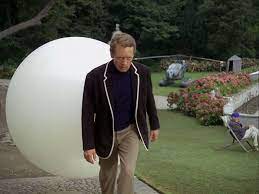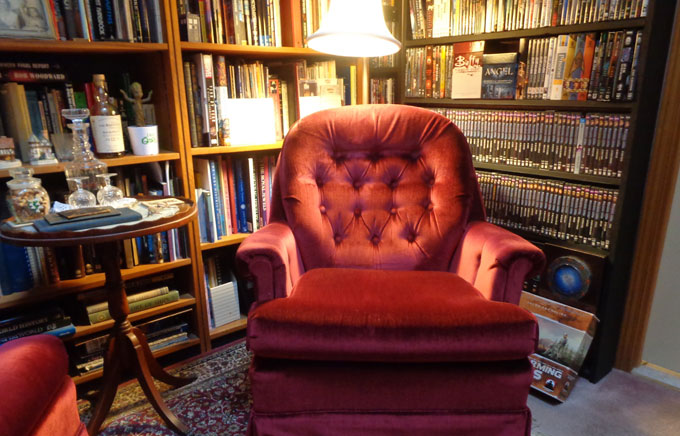
“I am not a number! I am a free man!”
A nameless British Intelligence Agent (Patrick McGoohan) storms into his supervisor’s office in London to hand in his resignation. He returns home in his Lotus Seven Roadster and packs a bag, not knowing that a hearse has followed him home. He is rendered unconscious by knockout gas and collapses in his study. He wakes up in what he believes is his London flat, but it is a duplicate in a place called the Village. He steps outside and finds strange, colourfully clad strangers living in quaint buildings and asks them what country he is in, but they are no help. The Village is surrounded by mountains except for a beach on the ocean. Returning to his flat, he answers the phone and is told that Number Two wants to meet him.
In the Green Dome, in which the entire Village is being monitored by cameras, Number Two (Guy Doleman) says he wants to know why the agent resigned and what side he’s on. The man is too valuable to be allowed to simply walk away. They would prefer to have his cooperation but will use other means to get answers if necessary. Number Two takes him on a tour of the Village and shows him the security systems. That includes Rover, a semi-intelligent floating balloon that will attack anyone who tries to escape. That night, the man tries to do just that, but the Rover attacks him, covers his face, and renders him unconscious.
He wakes up in the Village hospital and finds a former colleague named Cobb (Paul Eddington) in the next bed. The hospital staff take the agent away for examination and when he returns he is told that Cobb had committed suicide by jumping out the window. We can call this a Putin suicide. The agent goes to contact Number Two but finds a different Number Two entirely (George Baker), who tells him that no-one there has a name, only a number, which can change. The agent will henceforth be called Number Six. He replies that he refuses to be just a number. But in the rest of the series, nobody ever calls him anything but Number Six, and he never speaks his real name himself.
He goes to Cobb’s funeral and notices a woman watching him. She is Number Nine and says she had worked out an escape plan with Cobb. She gives him an electronic pass that will keep Rover off him and he can escape by helicopter. He follows her instructions, but a technician takes over and flies the helicopter remotely, back to the Village. Number Two watches Number Six as he is returned to his quarters. With him is Cobb, still alive. He warns Number Two that Number Six will be a tough nut to crack.
This first episode of the series was written by George Markstein and David Tomblin and Directed by Don Chaffey. It was broadcast on 29 September 1967 and introduced most of the idiosyncratic concepts of the series. It was filmed in the quaint tourist resort of Portmeirion, in Gwynedd, North Wales, which had also been used to portray a 17th Century kingdom in an episode of Doctor Who. Some of the series was directed by McGoohan. Rover was just a weather balloon, but creepy as hell. The music was by Ron Grainer, who created the Doctor Who theme. George Baker, the second Number Two, played Tiberius in the I, Claudius series.
Number Six gives his birthdate as 19 March 1928, 4:31 AM, the same as Patrick McGoohan. This means that McGoohan is a Pisces with Aquarius rising in the USA, where he was born, and an Aquarius with sun in Pisces in Britain, where he worked. He starred in the Danger Man (UK) and Secret Agent (US) series from 1964 to 1967, appeared in Ice Station Zebra in 1968, and won Emmys for playing a bad-guy on Columbo. He died in 2009. The helicopter appeared in the British Avengers series with Patrick Macnee, Honor Blackman, and Diana Rigg, and in The Saint with Roger Moore. The Prisoner series, which provided few answers to fans’ questions and was not afraid to puzzle them, is still deeply loved by SF fans of a certain age. An American remake in 2009, starring Jim Caviezel, did not generate such interest.
Patrick McGoohan had a handshake agreement with Sir Lew Grade, the impresario of the ITC network. McGoohan had complete control of the production and, for the time, a lot of money to work with. The production cost more than pretty much every other British TV series to make because so much of it was filmed in Portmerion, Wales, when most other shows were shot in studio or nearby on the London streets. The fact is: the whole show was in McGoohan’s head and pretty much invented as they went along. Whatever you might think of Sir Lew Grade, or Sir Low Grade as his detractors called him, he had the courage to hand an entire series over to one man just because he recognized him as brilliantly creative.
